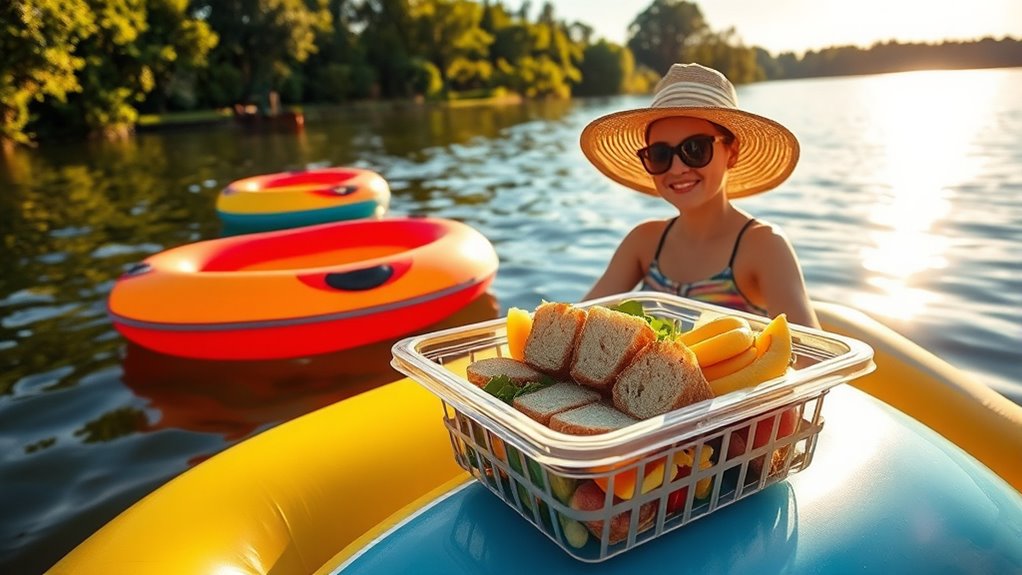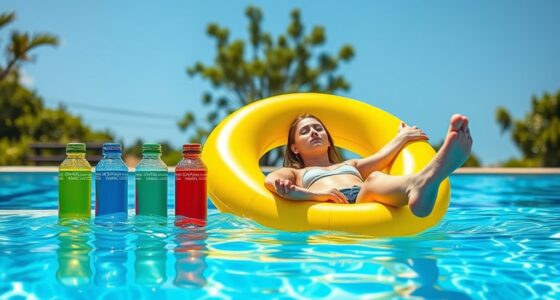When floating in warm weather, keep your food safe by storing perishable items in coolers with ice and avoiding prolonged sun exposure. Reapply sunscreen every two hours and wear protective clothing like hats and sunglasses to prevent sunburn, especially since water reflection increases UV exposure. Properly managed food storage and sun protection can make your water day enjoyable and safe. Continue exploring for more tips to have a fun, healthy adventure on the water.
Key Takeaways
- Keep perishable foods in coolers with ice packs to prevent bacterial growth in warm weather.
- Avoid exposing food to direct sunlight for extended periods to reduce spoilage risk.
- Reapply sunscreen every two hours and wear protective clothing to prevent sunburn during water activities.
- Limit the time perishable foods are left out in the heat to maintain safety and freshness.
- Combine proper food storage with sun protection measures for a safe and enjoyable floating experience.

As warm weather beckons you to enjoy floating adventures, it’s essential to remember that food safety remains a top priority. When you’re relaxing on a float or drifting in the water, the last thing you want is to compromise your health by neglecting proper food handling. One of the key factors to consider is water temperature, which can influence how long food stays safe, especially if you’re packing a picnic or snacks to enjoy while floating. Warm water temperatures accelerate bacterial growth, making perishable foods like sandwiches, fruit, and dairy more prone to spoilage. To prevent foodborne illnesses, it’s best to keep perishable items chilled in a cooler with ice packs, and avoid leaving them exposed to the sun for extended periods. Remember, even if you’re not directly in the water, ambient temperature and water heat can raise the overall temperature around you, increasing the risk of bacteria multiplying on your food. Proper food storage is essential to keeping your snacks safe in warm weather.
While focusing on food safety, don’t forget the importance of sunscreen application. Sun protection is vital when you’re out on the water, as reflected UV rays can cause sunburns and skin damage within minutes. Apply a broad-spectrum sunscreen generously on all exposed skin before you hit the water, and reapply every two hours or immediately after swimming or sweating. Many people overlook the fact that water can wash away sunscreen, leaving you vulnerable. It’s especially crucial to cover areas that are often neglected, like the ears, back of the neck, and feet. The combination of water exposure and direct sunlight amplifies your risk of sunburn, which can be painful and increase long-term skin damage. Wearing protective clothing, hats, and sunglasses provides additional safeguards, but sunscreen remains your first line of defense.
As you float and enjoy the warm weather, keep in mind that proper food safety practices go hand in hand with sun protection. Use coolers with ice to keep perishable foods at safe temperatures, and be vigilant about how long your snacks stay out in the sun. Similarly, apply sunscreen thoroughly and regularly to prevent sunburns that can ruin your day. Both water temperature and sunscreen application are simple yet vital steps to ensure your day on the water remains fun, safe, and healthy. By staying mindful of these details, you can relax, enjoy your floating adventures, and return home without worries about food safety or sun damage.
Frequently Asked Questions
How Can I Tell if Water Is Contaminated Before Floating?
You can tell if water is contaminated before floating by performing water testing with a reliable kit. Look for contamination indicators like foul odors, discoloration, or visible debris. If the water smells bad, looks murky, or has floating particles, it’s a sign of possible contamination. Always test the water if you’re unsure, and avoid floating in water that shows any signs of contamination to stay safe.
What Are the Signs of Food Spoilage in Warm Weather?
In warm weather, you can spot food spoilage by looking for mold growth, which appears as fuzzy or discolored patches, and noticing discoloration in the food itself. You might also smell sour or off odors, and the texture may become slimy or sticky. If you see any of these signs, it’s safest to discard the food immediately to avoid health risks. Always trust your senses and when in doubt, throw it out.
Are There Specific Safety Tips for Children Swimming and Eating Outdoors?
Sure, because nothing says “fun in the sun” like risking food safety and swimming mishaps. Always supervise children closely when they’re eating outdoors or swimming, following strict supervision guidelines to prevent accidents. Don’t forget sun protection—sunscreen, hats, and shade are essential. Keep an eye on them to make certain they enjoy the outdoors safely, avoiding both sunburns and food-related tummy troubles. After all, safety makes the fun last longer!
How Often Should I Sanitize Floating Devices During Hot Days?
You should sanitize floating devices daily during hot days. Follow a consistent cleaning frequency to prevent bacteria buildup, especially after each use or exposure to dirt and water. Establish a sanitization schedule that includes rinsing with soap and water, then disinfecting with a safe, non-toxic sanitizer. Regular cleaning keeps the devices hygienic, reducing the risk of infections, and ensures safe, worry-free fun in the sun.
Can Bacteria Grow on Food Stored Near Water Sources?
Yes, bacteria can grow on food stored near water sources, increasing the risk of food contamination. When food is close to water, especially if water isn’t clean or contains bacteria, it can transfer harmful germs to your food. To guarantee water safety, keep perishable foods away from water sources, store them properly in sealed containers, and regularly check for signs of spoilage. This helps prevent foodborne illnesses and maintains safe food handling.
Conclusion
As you enjoy floating in warm weather, remember that bacteria can double every 20 minutes in hot conditions, increasing the risk of foodborne illnesses. Keeping food chilled and avoiding cross-contamination is essential. Did you know that 48 million people get sick from food poisoning each year? By staying vigilant and practicing safe food handling, you can relax and have fun without worry. Stay safe, stay cool, and enjoy your time in the sun!










